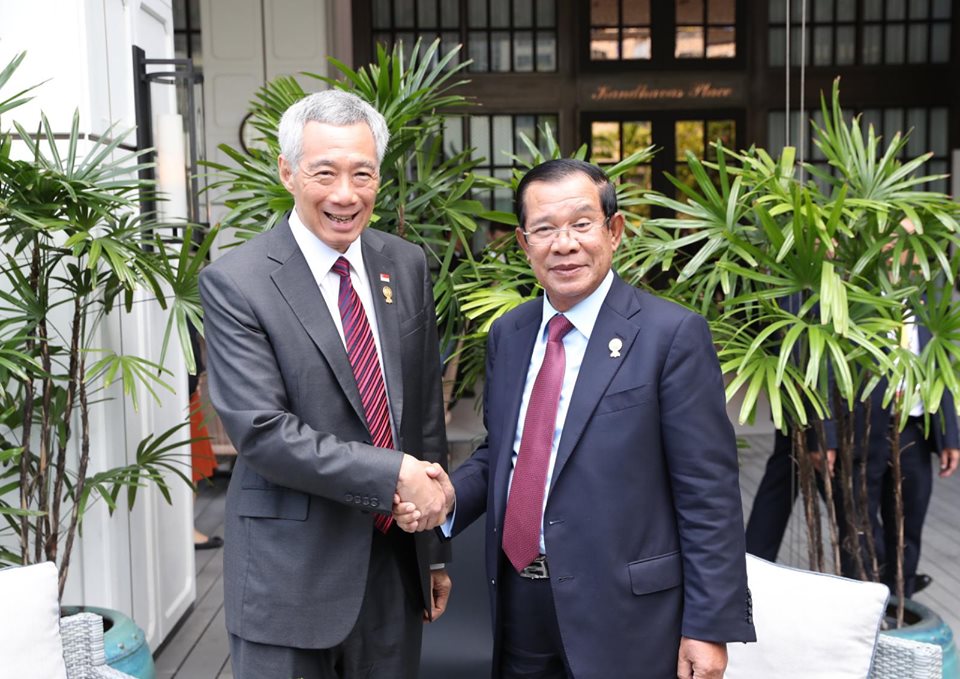Over the weekend, Prime Minister Lee Hsien Loong was in Bangkok, Thailand, for the 34th ASEAN summit.
And part of the summit saw him meet both his Vietnam and Cambodia counterparts, their first meeting after PM Lee's remarks on the 1978 Vietnamese invasion of Cambodia.
Different perspectives but good to meet to understand each other's positions
In a Facebook post, PM Lee shared that he met Cambodian Prime Minister Samdech Hun Sen on the sidelines, and he acknowledged that both Cambodia and Singapore held different perspectives of what he called the "war in Cambodia."
He added however, that it was good to meet directly to understand each other's positions.
Moreover, it was on such a basis that both sides have since agreed to move on from the issue, to further develop the relationship between both countries, at the bilateral level, and within ASEAN.
How did we get to this stage?
It started with a Facebook post on May 31
On May 31, PM Lee put up a Facebook post expressing condolence over the passing of Thai general Prem Tinsulanonda.
Part of the post saw PM Lee praising Prem for his leadership as Thailand’s Prime Minister, at the time of Vietnam’s invasion of Cambodia, and ASEAN’s subsequent opposition to the government that had replaced the Khmer Rouge.
This sparked of a flurry of anger in both Vietnam and Cambodia, with ministers from both countries taking offence at PM Lee's remarks.
Vietnam and Cambodia reacted in fury
On June 3, Cambodian Defence Minister Tea Banh raised his objections by stating that Lee's remarks did not reflect history, Cambodian English-language media Khmer Times reported.
He added:
"We cannot accept what he said. Vietnamese volunteer troops came to liberate our people. We still consider them as saviours — this means a lot for us."
Then on June 6, Hun Sen himself alleged that Singapore had come out in support of the genocidal Khmer Rouge regime during the time of Vietnam's invasion and occupation, and further desired the regime's return, according to the Khmer Times.
He further slammed PM Lee's statement as an "insult to the sacrifice of the Vietnamese military volunteers who helped to liberate Cambodia from the genocidal regime."
As for Vietnam, it expressed regret that the statement did not objectively reflect the historical truth, Vietnam Net Global reported.
On June 4, Le Thi The Hang, the spokesperson of Vietnam’s Ministry of Foreign Affairs (MFA) said the contribution and sacrifice of Vietnam in the joint efforts with Cambodian people to end the Khmer Rouge genocide regime have been “widely recognised”.
MFA responded with an explanation
Subsequently, on June 7, Singapore's Ministry of Foreign Affairs (MFA) put out a statement that clarified the contents of PM Lee's FB post on May 31.
Steering clear of the sensitive words “invasion” and “occupation”, the MFA spokesperson referred to the events from 1978 to 1989 as a “painful chapter of Indochina’s history”, and said PM Lee’s statement reflects Singapore’s “longstanding viewpoint” which was articulated publicly numerous times before.
The spokesperson added that while ASEAN collectively opposed the pro-Vietnamese government installed after the Khmer Rouge regime was ousted, Singapore had “no sympathy” for the regime.
The spokesperson also reiterated that Singapore did not want to see the Khmer Rouge regime return to Cambodia.
It was a stance that was reflected in ASEAN's actions to sponsor resolutions in the UN General Assembly which condemned the Khmer Rouge to “ensure it would not be part of any eventual government in Cambodia”.
As for PM Lee's remarks, the spokesperson clarified that his reference to this part of history was done to “explain how statesmanship and foresight helped to end the tragic wars that caused great suffering to the people of Indochina, and to bring about the peace and cooperation that the region enjoys today”.
Vivian Balakrishnan phoned the foreign affairs ministers of Vietnam and Cambodia
The same day also saw Foreign Affairs Minister Vivian Balakrishnan make separate phone calls to separate phone calls to Vietnamese Deputy Prime Minister and Minister of Foreign Affairs Pham Binh Minh, as well as Cambodian Deputy Prime Minister and Minister of Foreign Affairs Prak Sokhonn.
MFA's spokesperson elaborated that after Vivian explained the aforementioned points to his counterparts, they agreed that notwithstanding “the serious differences in the past”, they have taken “the path of cooperation, dialogue and friendship”.
As such, PM Lee's meeting with Hun Sen on June 23 can therefore be seen as a positive sign in how leaders have moved on from the spat.
Here's how the war in 1978 unfolded:
Background to the spat:
Top photo via PM Lee's Facebook page
If you like what you read, follow us on Facebook, Instagram, Twitter and Telegram to get the latest updates.
